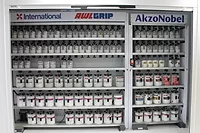BASF Calls First Phase of Restructuring ‘Largely Completed,' Takes Aim at Further Moves
BASF also said it will seek to achieve additional savings by relocating its North American regional headquarters from Mount Olive, NJ, to smaller offices in Florham Park, NJ, by the end of the third quarter. The company said it plans to sell the current headquarters facility, which is less than 40% utilized following the 2001 sale of Knoll Pharmaceuticals.
The first phase of the restructuring program involved a reduction of approximately 1,000 employment positions in the areas of information technology, logistics, finance, human resources, legal, and purchasing. The second phase will involve optimization of site operations and the reduction of approximately 750 employment positions.
The program also will involve a number of changes at manufacturing sites, including the retrofitting of a former vitamins plant at BASF's Wyandotte, MI, site to produce amino resins for the North American coatings market.
In addition to restructuring actions designed to cut costs, BASF said it will seek to boost profitability by pursuing acquisitions, joint ventures and site investments that will expand profitable product lines and markets in North America.
The company said it has made a number of "targeted acquisitions" in the past year, including the purchase of Honeywell's engineering plastics business, Ticona's nylon 6,6 business, ExxonMobil's Vistanex polyisobutylene business, and Sunoco's plasticizers business. Investments in production expansions include a styrene-butadiene copolymers plant in Altamira, Mexico, which began production in January.
Klaus Peter Löbbe, chairman and CEO of BASF Corp., BASF's North American affiliate, said the North American market "remains highly challenging and is currently characterized by high raw material costs, low capacity utilization and tough competition." Löbbe said that to be "a leading player in this market, we must be in top condition. This means that we must not only reduce our costs, but also focus on strengthening our profitable businesses."
Looking for a reprint of this article?
From high-res PDFs to custom plaques, order your copy today!






